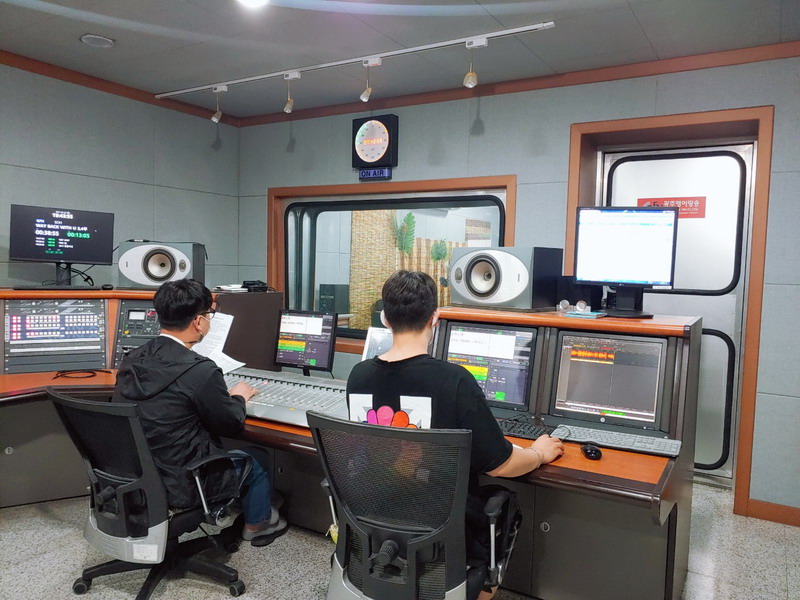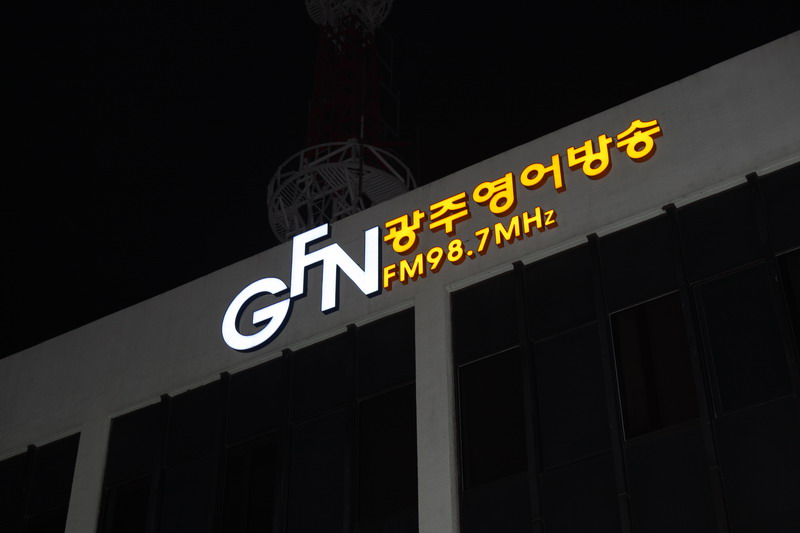GFN Goes Bilingual: Interview with PD Choi Hang
In continuing its collaboration with the Gwangju Foreign Language Network (GFN), in this issue the Gwangju News offers an interview with Choi Hang, GFN’s Program Director (PD) in charge of the Way Back with U program, the new bilingual sensation. — Ed.
Gwangju News (GN): Thank you for taking the time to participate in this interview for the Gwangju News, Mr. Choi. First, please introduce yourself by telling us about your background and about GFN. Also, how long have you been working for GFN?
Choi Hang: First of all, thank you, Gwangju News, for offering me this opportunity. My name is Choi Hang [최항], and I have been working at GFN for six years. There are three foreign language broadcasting companies nationwide: Seoul TBS efm, Busan BeFM, and Gwangju GFN. My main reason for joining the Gwangju Foreign Language Network was because I wanted to create and deliver a program that provided useful information related to the daily lives of the citizens and international residents living in Gwangju and Jeonnam.
GN: Please describe your main duties as a PD and the challenges that come with them.
Choi Hang: My main duties are program planning and production. The shows I am currently in charge of are Way Back with U, Music on the Road, and documentary productions that are in progress. In addition, I am also planning and conducting various festivals and events in cooperation with related organizations in Gwangju and Jeollanam-do. I also oversee the paperwork and visa documents for our international friends who join the station.
GN: What programs did you do before Way Back with U, and which one was your favorite?
Choi Hang: I was in charge of Hello Korea, Viva DJ, Real Talk, and Weekly Review before this new bilingual show I am doing now. Each program had a different personality, and I took charge of each of them with affection. If I had to pick one out as a favorite though, it would be Hello Korea, which transmitted information necessary for real life such as facts about Korean culture, language, history, music, food, travel destinations, art, and traditions to locals and international residents of Gwangju and Jeollanam-do. I also coordinated the longest on this program.

GN: How is this newest program, Way Back with U, different? What does it offer listeners?
Choi Hang: Firstly, it is live, and secondly, it is bilingual, being produced in a way that both Koreans and international listeners can easily understand and learn about today’s issues in a fun way. It runs for two hours, has two hosts, and has a single segment format, rather than a segmented corner and multiple guest appearances like other existing GFN programs. I think the charming point is that it is broadcasted live and communicates with listeners in real time.
GN: Please tell us about the Music on the Road show.
Choi Hang: Music on the Road invites musicians from Gwangju and Jeollanam-do directly into the studio to talk about their music and share their stories. Local musicians create their own radio shows for an hour as a radio host. It is a program that provides local musicians with the opportunity to be radio hosts, to tell their stories, and to introduce their albums to listeners in a direct way.
GN: Please tell us about the documentary Chosun Pop 3.0 Era (조선 팝 3.0시대), which was selected as a broadcasting promotion project by the Foundation for Broadcast Culture (FBC) in 2021.
Choi Hang: Chosun Pop 3.0 Era is produced as two episodes under the theme of K-pop Chosun, which takes the method of using Korean traditional music (gugak) to another level. One such example is “Tiger Is Coming,” a song by alternative pop band Leenalchi that gained tremendous popularity by making traditional music commercial. Instead of morphing it into fusion or crossover music, which is common for “globalization,” the documentary shows how the group promotes “raw” and “crude” traditional Korean music. The aim was to revive the popularity of Lee Nal-chi, one of the most famous pansori (판소리) and jultagi (줄타기, tightrope-walking) masters of the 1880s, by featuring the present-day band Leenalchi, who has dazzled the world by following that spirit.
GN: You were also part of the team who made the documentary “5.18 미얀마 다큐 주제 ‘미얀마를 위한 광주행진곡'” (March for Democracy: Save Myanmar, Pray for Myanmar). Please give us some details about that.
Choi Hang: March for Democracy, which was planned by Kim Mi-young and directed by Noh Hyung-jin and myself, is a special documentary produced to commemorate the 41st anniversary of the May 18 Democratization Movement. It is a two-part documentary in Korean and English that conveys the reality of the ongoing unrest in Myanmar and explores the impact of Gwangju’s Democratization Movement, focusing on their restoration of democracy and the way to unite in the future. The first part, “Save Myanmar,” talks about the democratization movement led by Myanmar’s Gen Z, which is currently at the center of the protests, and the history of Myanmar’s military rule. The second part, “Pray for Myanmar,” tells the story of Gwangju’s longing for spring in Myanmar and the solidarity of our city, which still holds the scars of the May 18 Democratization Movement. It would be great if listeners could hear a little bit about the democratization movement led by the youth of Myanmar and the history of the country’s military rule to feel the solidarity between us in the fight for democracy so that our message can be delivered to Myanmar.
GN: Thank you very much for your time. The Gwangju News and the GIC support and love the variety of programs that GFN produces and encourage everyone to tune in daily.
Interviewed by Melline Galani.
Photographs by Choi Hang.







